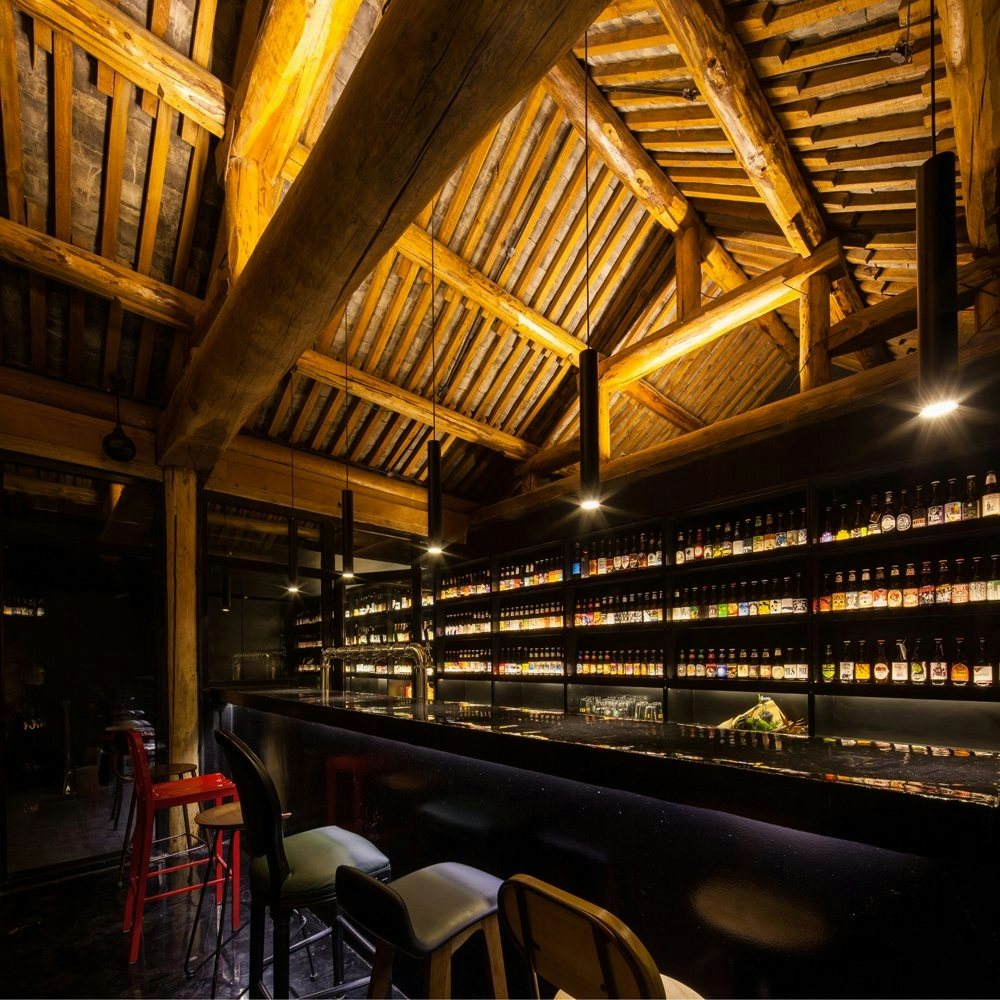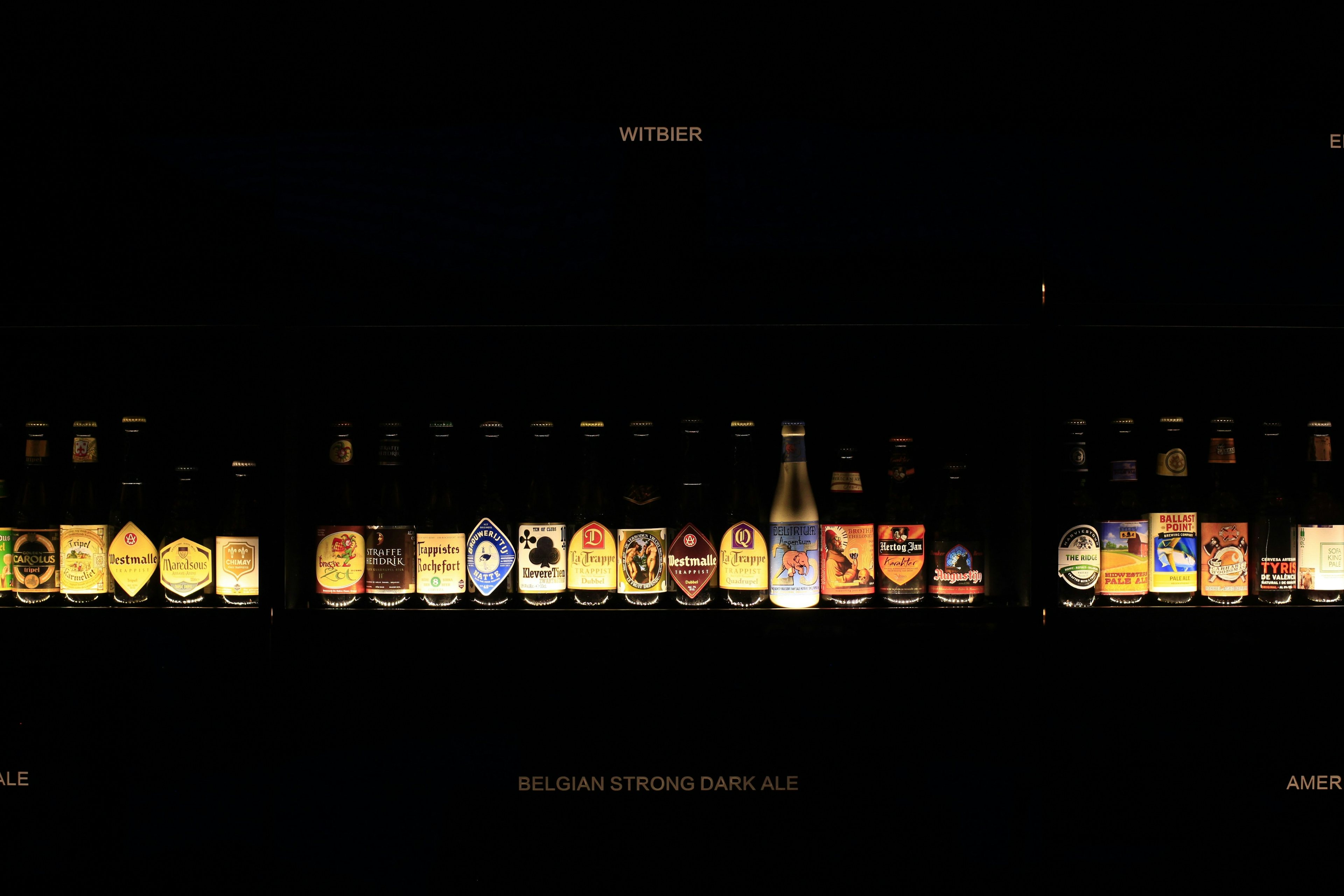Against a bar counter and a black backsplash, Mikkeller beer's rainbow palate of quirky labels pops. The Danish brand, a rare find in Beijing, is only one in more than 700 brews that line the walls of C2H60, a bottle bar in China's capital that's dedicated to educating the growing middle class on the difference between an IPA and a stout, doing so in a chic environment that weaves tech with design.
It's certainly a step in a different direction than the exposed pipes, wooden bar counters, and loft feel that other local craft beer bars have been taking. Jing A, Great Leap, and Slowboat Brewing Company have all adopted some form of this popular look, and it has also been reinvented time and time again in China's craft breweries that have opened in the past year.
C2H60's five founders, all designers, enlisted the help of architect Liang Chen to give their space swanky vibes with a sleek, dark, minimalist interior, set in a hutong courtyard under restored lofted wooden ceilings and closed in by a bamboo garden. The entrance is private, only accessible by scanning a QR code and signing up for a WeChat membership. Reservations are preferred. Its prestigious presence is emphasized by the black Audis flocking the entrance, which is located just minutes away from fine dining spot Temple Restaurant Beijing.

At first glance, the luxurious touch might seem better suited for a cocktail bar. But premium beers are set to make up one-third of China's beer market by 2020, up from less than 10 percent in 2010, and last year, imported high-end beers in China were up by 60 percent. All of these beers are popping up in Western-style restaurants, bottle bars, and supermarkets in China, but C2H60 co-founder Wu Qia said he saw a gap in the market when it came to actually informing consumers about what they were drinking.
“When customers go to Great Leap and drink an IPA, they know it's different, but they don't know why it's different,” Wu said. China's own beer market is filled with pale, lager-style brews like Tsingtao, Yanjing, and Snow beer.
Wu said that while local craft beers like Jing A and Nbeer are popular in Beijing, he finds that Chinese consumers are increasingly interested in imported beers because they have more of a history. To help things along, Wu and his team developed a bilingual mobile app that serves as a digital library for everything they have in stock. Customers can use it to search for their ideal beer by style or by country. Each style comes with a story and a flavor profile for ease of choice.
Customers can also browse C2H60's selection by referring to the meticulously organized stock, spotlighted on black shelving. Most beers are organized by style, but some are organized by origin, such as the Chinese craft beers, which even include brews made outside of Beijing and Shanghai like Nanjing's Master Gao. Imported beer remains the ultimate focus, and Wu said they plan to constantly rotate the selection.
All of it is a dream-come-true for beer enthusiasts, and an opportunity for exploration for the curious consumer. Other players in the alcohol industry have embarked on similar educational endeavors, with Beijing bar owners launching a membership-based spirits tasting club and wine connoisseurs turning to an abundance of label recognition apps. In this case, it is about giving customers access to beers they might not normally be able to try. While C2H60's clients tend to spend 50 RMB ($7.50) and above on a beer, which averages out to be about 10 times the price of a pint of a local lager, beers at C2H60 go way up in price depending on their rarity.
Currently, the most expensive beer on offer is Epic's The Observer Timeless Ale from New Zealand at 350 RMB ($52.50) and a Rogue Imperial Stout from Oregon at 340 RMB ($51). The whole point, though, Wu said, is that price is far from the customer's mind—“They’re interested in the beer.”
